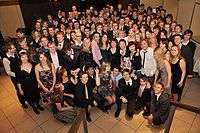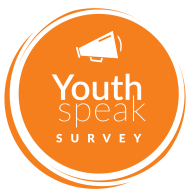AIESEC
| Motto | "Empowering Young People for Peace and Fulfillment of Humankind's Potential" |
|---|---|
| Formation | 1948 |
| Type | Not-for-profit |
| Legal status | Active |
| Purpose | Leadership development |
| Headquarters | Rotterdam, Netherlands |
Region served | Worldwide |
Membership | 70,000 |
Official language | English |
President of AIESEC International (PAI) | Niels Caszo [1] |
Main organ | Global Plenary |
| Website |
www |
| Remarks | The world's largest youth-run organization |
AIESEC is an international non-governmental not-for-profit organization that provides young people with leadership development and cross-cultural global internship and volunteer exchange experiences across the globe, with a focus to empower young people so they can make a positive impact on society. The AIESEC network includes approximately 70,000 members in 127 countries and territories. It is the largest youth-run organization in the world.[2]
AIESEC is a non-governmental organization in consultative status with the United Nations Economic and Social Council (ECOSOC), is affiliated with the UN DPI[3] and UN's Office of the Secretary-General's Envoy on Youth,[4] member of ICMYO,[4] and is recognized by UNESCO.[5] AIESEC's international headquarters are in Rotterdam, Netherlands.[6]
Name
AIESEC was originally a French acronym for Association internationale des étudiants en sciences économiques et commerciales (English: International Association of Students in Economic and Commercial Sciences); however, the full name is no longer officially used as members can now come from any university background.
History
Founding

The idea behind AIESEC started in 1938, when representatives from schools across Europe exchanged information about various programs and schools that specialized in business and economics. Students were carrying out internships in other countries. Mostly on their own initiative but it came to a standstill with the onslaught of World War II.[7]
In 1944, the neutral Scandinavian countries were still exchanging students. In Stockholm, Bertil Hedberg, an official at the Stockholm School of Economics, and students Jaroslav Zich (of Czechoslovakia), Jean Choplin (of France) and Stanislas Callens (of Belgium) founded AIESEC. This was the predecessor of AIESEC,[7] which was officially founded in 1948. At the time, the organization's stated mission was “to expand the understanding of a nation by expanding the understanding of the individuals, changing the world one person at a time.”[7]
At the time of AIESEC's founding at the conclusion of the 1940s, Europe was in the midst of recovery from the war that dealt grave losses to its population. Factories and enterprises were in desperate need of executives, managers and leaders. The continent needed more than just business development, however; the war had severely damaged relations between European nations, and many members of the community felt steps needed to be taken to address this problem.[8]
AIESEC was formed to address both of these concerns. Students from seven nations: Belgium, Denmark, Finland, France, Netherlands, Norway and Sweden came together in March 1949 for the first International Congress of AIESEC in Stockholm.[9] The founders composed a constitution for the new organization and defined a purpose: "AIESEC is an independent, non-political, and international organization which has as its purpose to establish and promote the friendly relations between the members."[8]
In the first year of AIESEC's existence, 89 students were exchanged among the member nations.
Global expansion

The organization grew exponentially in the following years, with more than 1,000 exchanges took place in 1955 alone, the same year that Israel became the first non-European member.[9] In the following few years, AIESEC quickly became global by establishing its first North American member, the United States, in 1957, and its first South American and African members, Colombia, Venezuela, and South Africa in 1958.[10]
For the first years of its existence, AIESEC had no central governing body, but was instead managed jointly by a Presiding Country Committee composed of the National Committee Presidents of each member nation. As the organization grew, a central governing body was created and led by democratically-elected Secretary General. Morris Wolff, from the United States, was chosen as the first Secretary General in 1960, and established the first permanent international office for AIESEC in Geneva, Switzerland.[8] Over the following decade, AIESEC expanded to eastern Asia, Australia, and deeper within Europe, Africa, North America, and South America, having a presence in 43 countries by 1969.[10]
Today
As of 2015, AIESEC has since expanded to 127 countries and territories across the globe.[2][10] AIESEC annually offers over 27,500 leadership positions and delivers over 500 leadership conferences to its membership of over 100,000 students. It is present in over 2,400 universities in its 127 member countries and territories across the globe and its international exchange program that enables over 27,500 students and recent graduates the opportunity to work or volunteer in another country. AIESEC is supported by over 8,000 partner organizations.[2]
Programmes
Campus Involvement
AIESEC provides a platform for students in different universities and colleges, by going on an international internship and/or by joining various local chapters. These young individuals can develop their leadership potential by working and leading teams. Associate membership opportunities allow the students to work with various NGO partners of AIESEC, and represent their college as a part of campus ambassador program.The organizations products are Team Member (TM), Team Leader (TL), Incoming exchange (ICX) and Outgoing Exchange (OGX).
Each year members have an opportunity to live and work in a foreign country. Participants can choose to work in areas of management, technology, education, or development; helping to build one’s corporate skills.[11]
Conferences

AIESEC hosts over 500 conferences every year that range in length and demographic scope. The purpose of conferences are to bring the international community of AIESEC members together to enhance their professional skills, provide networking opportunities, and work on organizational strategy. Topics of interest the organization focuses on include: Leadership, Sustainable development, Entrepreneurship, Innovation, Corporate Social Responsibility, and youth impact on modern society.
Global Talent
Global Talent is an AIESEC program which offers paid management and technical internships. They are normally long term in nature and involve working on diverse business projects and in different organizations. The internship duration is 3 to 18 months. The intern receives a stipend which covers living costs. Airfare to and from the destination is not included. There are three types of internships:
- Management; related to administration, finance, accounting, marketing, project management and HR
- Technical; related to management and development in web, software, IT networks and databases, plus some engineering
- Education; related to promotion, curriculum development, teaching, and counselling in the education sector
Global Volunteer
Global Volunteer is an AIESEC program which offers voluntary internships. They are usually short term in nature and involve working on diverse community projects and in different organizations. Projects include teaching, promoting HIV/AIDS awareness, working in human rights, environmental sustainability, leadership development and more. The exchange participants are to bear the airfare, travelling, shopping and visa expenses. AIESEC makes a genuine effort, but does not ensure securing an internship in any country of the participant’s choice. The likelihood of getting an internship increases considerably, if a visa-friendly country is taken into preference.

YouthSpeak
YouthSpeak Initiative is a youth movement powered by AIESEC.[12] AIESEC believes that the society needs the young people of the world to take action on the UN goals for 2030, and AIESEC serves as a platform for youth empowerment.
- YouthSpeak Survey aims to collect the common voice of the global youth and educate them about the Global Goals for Sustainable Development. There are 1.8 billion young people in the world and their voice needs to be heard.
- YouthSpeak Forum gathers the youth as future leaders and current ones into same action space.
Awards and recognition
In July 2015 AIESEC was recognized for the 9th time on the WorldBlu list of "Most Freedom Centred Workplaces." An organization makes it onto the WorldBlu List through a rigorous Freedom at Work™ assessment process completed by employees. The assessment evaluates the overall design of an organization along a fear-based to freedom-centred continuum in three core areas: leadership, individual performance and systems and processes.
Members
As of 2015, AIESEC is found in 127 countries and territories worldwide, including:[13]
- Afghanistan
- Albania
- Algeria
- Argentina
- Armenia
- Australia
- Austria
- Azerbaijan
- Bahrain
- Bangladesh
- Barbados
- Belarus
- Belgium
- Benin
- Bolivia
- Bosnia and Herzegowina
- Botswana
- Brazil
- Brunei
- Bulgaria
- Burkina Faso
- Cambodia
- Cameroon
- Canada
- Cape Verde
- Chile
- China
- Colombia
- Costa Rica
- Ivory Coast
- Croatia
- Czech Republic
- Denmark
- Dominican Republic
- Ecuador
- Egypt
- El Salvador
- Estonia
- Ethiopia
- Finland
- France
- Gabon
- Georgia
- Germany
- Ghana
- Greece
- Guatemala
- Hong Kong
- Hungary
- Iceland
- India
- Indonesia
- Iran
- Ireland
- Italy
- Japan
- Jordan
- Kazakhstan
- Kenya
- Kuwait
- Kyrgyzstan
- Laos
- Latvia
- Lebanon
- Liberia
- Liechtenstein
- Lithuania
- Luxembourg
- Macedonia
- Malawi
- Malaysia
- Malta
- Mauritius
- Mexico
- Moldova
- Mongolia
- Montenegro
- Morocco
- Mozambique
- Myanmar
- Namibia
- Nepal
- Netherlands
- New Zealand
- Nicaragua
- Nigeria
- Norway
- Oman
- Pakistan
- Panama
- Paraguay
- Peru
- Philippines
- Poland
- Portugal
- Puerto Rico
- Qatar
- Romania
- Russia
- Rwanda
- Senegal
- Serbia
- Seychelles
- Singapore
- Slovakia
- Slovenia
- South Africa
- South Korea
- Spain
- Sri Lanka
- Sweden
- Switzerland
- Taiwan
- Tajikistan
- Tanzania
- Thailand
- Togo
- Tunisia
- Turkey
- Uganda
- Ukraine
- United Arab Emirates
- United Kingdom
- United States
- Uruguay
- Venezuela
- Vietnam
See also
References
- ↑ http://aiesec.org/about-aiesec/leadership-team/, https://www.facebook.com/AIESECIntlTeam/?fref=ts
- 1 2 3 "AIESEC in Numbers". www.aiesec.org.
- ↑ "NON-GOVERNMENTAL ORGANIZATIONS COMMITTEE RECOMMENDS 52 ORGANIZATIONS FOR CONSULTATIVE STATUS WITH ECONOMIC AND SOCIAL COUNCIL". www.un.org.
- 1 2 Ruggiero, Cassandra (22 September 2013). "The end of the IANYD and ICMYO Meetings – just the start of AIESEC's involvement with the United Nations". AIESEC International.
- ↑ "UNESCO English Search: AIESEC". UNESCO.
- ↑ "AIESEC: Contact Us". AIESEC.
- 1 2 3 Kern, Beth (2003-10-02). "AIESEC Helps Interns Make Adjustments". University Chronicle. Retrieved 2008-02-11.
- 1 2 3 "AIESEC 60 Years".
- 1 2 "AIESEC History". www.aiesec.org.
- 1 2 3 "AIESEC Expansions since 1948". Youtube.
- ↑ "AIESEC Programmes".
- ↑ "Youthspeak - Global Youth Movement". YouthSpeak. Retrieved 2016-03-10.
- ↑ "AIESEC: Contact Us".
External links
| Wikimedia Commons has media related to AIESEC. |